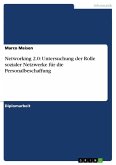Diplomarbeit aus dem Jahr 2005 im Fachbereich Informatik - Wirtschaftsinformatik, Universität Zürich, Sprache: Deutsch, Abstract: In Ergänzung zum klassischen Projektmanagement fokussiert sich der systemische Projektmanagementansatz des Foschungsschwerpunktes "Mensch Informatik Organisation" an der Universität Zürich auf soziale Erfolgsfaktoren. In diesem Rahmen soll die Bedeutung von Macht in Informatikprojekten untersucht werden.Zunächst erfolgt eine Literaturanalyse bezüglich der Thematisierung von Macht und dem Umgang mit Macht. Anschliessend wird Macht aufgrund der Luhmannschen Systemtheorie in Projekten untersucht. Eine Umfrage geht schliesslich der Ausprägung und Erfolgsrelevanz von einzelnen Machtquellen in Informatikprojekten nach. Die Auswertungen gewichten einzelne Machtfaktoren und ergeben eine Skizze eines Führungsansatzes aus der Machtperspektive, der auf dem MIO-Interventionszyklus basiert. Dieser Führungsansatz beinhaltet eine erfolgsrelevante Gewichtung der Machtquellen und integriert einen Methodenkatalog zum Umgang mit Macht.In addition to the classic project management, the systemic project management approach of the main research "Mensch Informatik Organisation" of the University of Zurich focuses on social success factors. In this framework, the meaning of power in computer science projects should be examined.At the outset the paper contains a literary analysis of power and its handling, followed by the concept of power in projects using the Luhmanns system theory. A survey finally pursues the shaping and success relevance of individual power sources in computer science projects.The evaluation puts a weight on individual power factors and thus demonstrates a leadership from the perspective of power, that is based on the "MIO-Interventionszyklus". This approach comprises of a success-relevant emphasis of the power sources and integrates a method catalogue on how to handle power.








